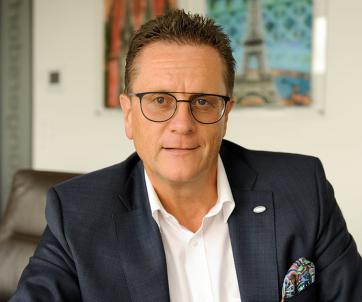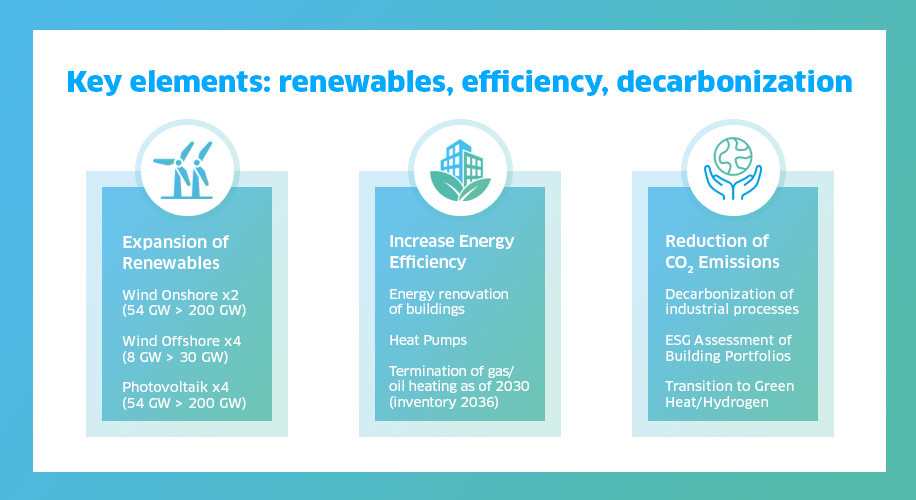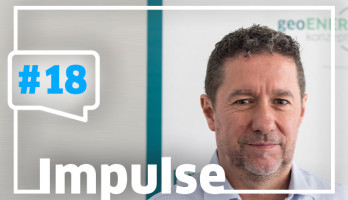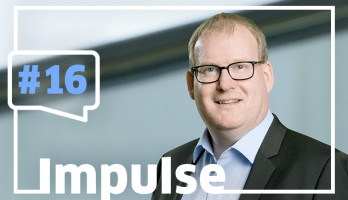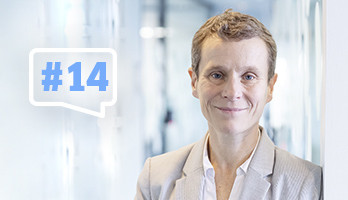
"Dare to make progress – and dare to be creative! Then the 2021–2025 coalition agreement will guide us into a green future, rich with opportunity."
I consider January to be one of the most exciting months of the year. I love the feeling of starting afresh, the readiness to take on new challenges, and the courage to move ahead that the start of the year traditionally brings with it. This year, this new start is characterized in particular by the coalition agreement which the German government presented in December of 2021. In my mind, the slogan “Mehr Fortschritt wagen” or “Dare to make progress” is a hopeful promise, certainly appropriate for the new year. But does the coalition agreement actually contain any promised progress for the energy economy? I would like to share my personal thoughts on this matter today, along with ENGIE Deutschland's view of the coalition agreement.
“Fit for 55” – the European framework for climate neutrality
What will change, and what remains the same? When it comes to working within the framework of the “Green Deal” climate concept and the “Fit for 55” measure of the European Union to fulfill the specified climate targets, of course, nothing has changed in the new legislative period. These goals have been on the table since 2019: the European Union aims, firstly, to reduce greenhouse gases by 55 percent by 2030, and secondly to achieve climate neutrality by 2050. Germany's national goals of reducing greenhouse gases by 65 percent in comparison to 1990 levels by 2030, and becoming climate neutral by 2045, are derived from these. These reduction targets are extremely ambitious, and will result in disruptive changes in all sectors and demand an enormous amount of effort from all of us. We are well aware of all of these factors, and they serve as the framework for officials and the German federal government. In this respect, many of the issues decided on during the last legislative period will remain pertinent. However, calls for an even stricter course have recently become louder. Few doubt that we must do much more, and much more quickly than we have in the past – increasing environmental catastrophes like the flooding last summer serve as alarming warning signals. There are some political missteps which must be corrected, and past omissions which must be made up for. This only increases the expectations placed on the red-green coalition.
Pillars for the climate
The European Union has established three central pillars for climate policy on which all member states must act: renewable energy sources, decarbonization, and energy efficiency. How Germany will approach these pillars concretely now is a question for the (still somewhat) new Ampel ("traffic light") coalition, and one whose answer is eagerly awaited. In the coalition agreement they provide an answer - one which, in my opinion, does establish a political stance and does point in the right direction. Let’s take a closer look at the three pillars.
New energy from renewable sources
Renewable energy sources are a key pillar for climate neutrality, and therefore play an important role in the coalition agreement. In Germany, we aim to generate 80 percent of our electricity and 50 percent of our heat from renewable energy sources by 2030 – thus far, we have generated 65 percent of electricity from such sources. We at ENGIE Deutschland welcome the plan to greatly accelerate this expansion, as outlined in the coalition agreement, and as Economic and Climate Protection Minister Robert Habeck emphasized a few days ago in his “Eröffnungsbilanz Klimaschutz” (Climate protection opening balance sheet). For quite some time, we have been expressing the criticism that more speed is essential to achieving this target, and that implementation must become more practical. I feel it is a positive signal that the coalition agreement contains concrete specifications and approaches to this goal: onshore wind capacities will be doubled by 2030, and quadrupled for offshore wind and photovoltaic systems. This can only be achieved if photovoltaic systems, for example, are no longer placed only on open spaces beside highways in the future, but are truly omnipresent. Germany is poorly positioned in this area. I am thinking in particular of multi-story buildings in cities that offer a major potential for installing rooftop solar systems. These could be combined with tenant electricity supply, the specialty of the start-up Solarimo, founded by ENGIE Deutschland. At the same time, my team and I are aware, from many discussions with our customers, that such projects often do not pay off, or are even penalized from the standpoint of the EU taxonomy. However, they certainly do pay off from a purely climate policy standpoint. Because of this, the legislature must provide more incentives and public funding if we want to truly take our climate targets seriously. In my opinion, the same is true of wind energy: I wish the federal government could finally speed up planning and approval processes. Allow me to note here that I certainly understand people who do not want wind turbines placed near their homes, and that protection for different species and local residential areas is important. However, we must grant priority to protecting the climate in this matter. There is no other way to proceed, if we want to have a positive future for our planet and for mankind.
Energy efficiency as the key element
I have written quite a bit thus far about renewable energy. The other two pillars are decarbonization and energy efficiency – what new approaches does the coalition agreement hold on these issues? With respect to decarbonization: it states that CO2 must be monetized, and that the heating and traffic sectors must be much more electrified. Likewise, the statement that we will need gas as a bridge technology during the long-term conversion of the energy system by 2045 – when its use is slated to end – is common sense. New power plants with a total output of 30 Gigawatts are needed to cover consumption up to that point. However – is the private sector even prepared to make these investments? And, if we intend to make use of hydrogen after 2045, don't we need to build the infrastructure for this technology today? Or will the existing gas infrastructure be used for this purpose? And with respect to energy efficiency – as you know, this is a topic which is close to my heart. At ENGIE Deutschland, we see energy efficiency as the first important step on this path of transformation. You can learn more about our “Real Zero concept” on our website. The “Efficiency First” principle is a major climate policy objective in the “Fit for 55” package. Likewise, in the coalition agreement the German federal government promises: “We will make Germany the most efficient national economy in the world.” But how, exactly, does the German legislature support companies in making their systems more efficient and in conducting energy efficiency renovations of their buildings? Currently, the KfW (Kreditanstalt für Wiederaufbau or Reconstruction Loan Corporation) grant has been suspended, as new and more ambitious efficiency standards are to be established. This is nothing new for new buildings. Will binding minimum standards now be established to make existing buildings climate neutral? The fascinating, overarching question remains: what will Germany's concrete energy efficiency strategy look like through 2030?
Daring to be creative
Dear readers, I hope you will allow me to add a dash of “reality” to my musings here. Please don’t misunderstand me: I certainly do find the climate policy approach of the coalition agreement to be optimistic; I consider it to be an initial foundation for actually accelerating our work in order to achieve climate neutrality. The document contains concrete, ambitious approaches to renewable energy. However, I believe that the path of development in terms of decarbonization and energy efficiency is not yet quite as solid. Many questions remain open, including those I have posed above – and many opportunities go unrealized. Overall, I feel that the document lacks a sense of spirit, and a clear positioning for Germany as a pioneer within the European Union. We have a responsibility to do more than just meet minimum European standards. We need more courage to make a change, more courage to achieve clarity and focus on creativity – this is my personal wish for the political realm. In this way, we can achieve more progress together not only in the energy economy, but for our economy as a whole.
I am interested, once again, in hearing your opinions: what do you feel are the highlights – or lowlights – of the coalition agreement? Please send your ideas on this topic to manfred.schmitz@engie.com.
Warmest regards
Manfred Schmitz
CEO of ENGIE Deutschland
Our Expert
